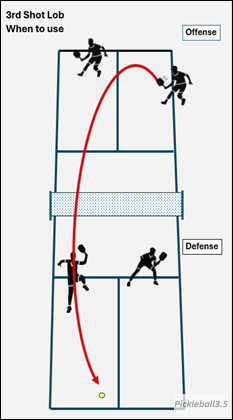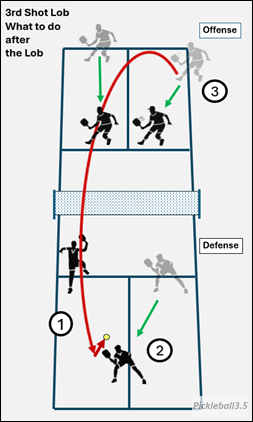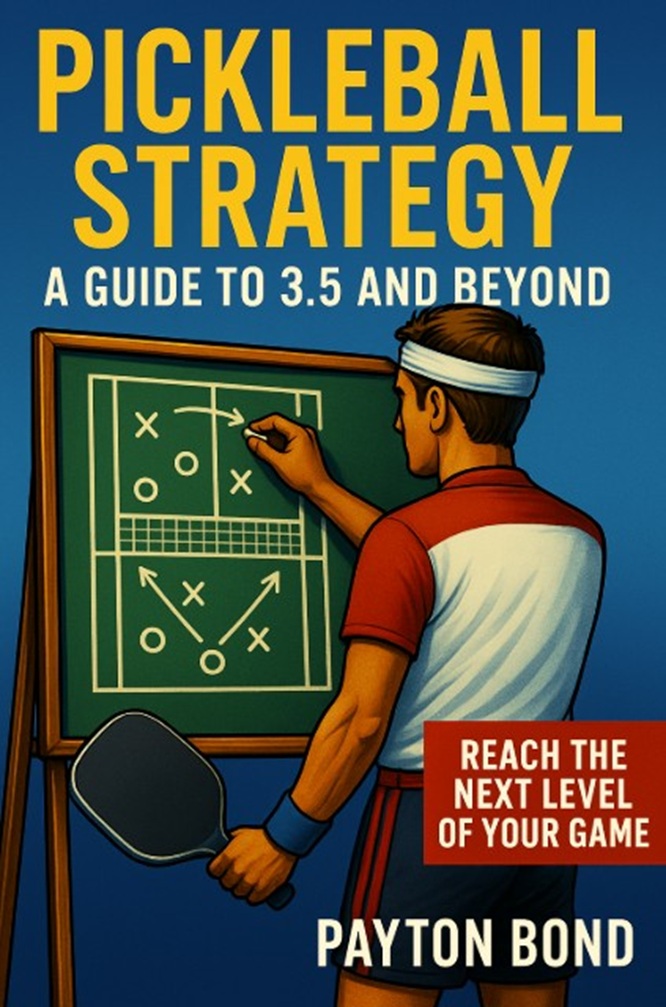
What Is a Pickleball Lob Shot?
The pickleball lob shot is a high, arching shot designed to clear your opponent’s head and land near the baseline. When executed well, it forces your opponents into a difficult position:
- They may attempt an overhead smash from an awkward angle.
- They might let the ball bounce and scramble to return it.
Though sometimes seen as a defensive play, the lob shot can be a strategic tool to force opponents off the kitchen line and reset the rally. When used at the right moments, it becomes a calculated move rather than a last-ditch effort.
When to Use the Pickleball Lob Shot
The illustration below shows a player hitting a lob shot over the head of their opponent.

A well-placed lob can shift the momentum of a rally, but using it randomly can backfire. Here’s when a lob shot makes sense:
1. Deep Return of Serve
When you receive a deep, fast return that makes a third-shot drop or drive difficult, a lob can be an effective way to relieve pressure. A well-placed deep lob forces opponents to retreat, giving you time to advance.
Be careful: A shallow lob against skilled players often leads to an easy smash.
2. Short Return of Serve
If your opponent’s return is short, you might have to lunge forward to reach it. In situations where a controlled third-shot drop or drive is difficult, a lob can be a smart alternative.
3. Drop Shot Fake
Faking a drop shot before transitioning into a lob can catch your opponents off guard. If they expect a soft shot and move in, a lob forces them to reverse course and scramble backward.
4. Lob Shot Reset
When your opponents are firmly positioned at the kitchen line and you’re struggling to regain control, a lob can act as a reset. By forcing them to backpedal, you create space to move forward and reorganize your positioning.
5. Dink Fake Lob
During a dink exchange, mixing in a lob can be a game-changer. Just as your opponent leans in for another dink, sending the ball over their head shifts the dynamic of the rally.
When It’s a Good Lob
A well-executed lob accomplishes two main goals:
- Forces your opponents to retreat: This disrupts their control at the kitchen line and puts them on the defensive.
- Gives you time to advance: If the lob bounces deep, you and your partner can move up and take a stronger position.
Important Note: If your lob doesn’t bounce and your opponent prepares for a smash, advancing too soon can leave you vulnerable. Always assess their response before moving forward.
How to Defend Against a Poor Lob
Not every lob is executed well. If you hit a weak lob, your opponents will likely respond with a smash. Here’s how to prepare:
Stay low and be ready: Lower yourself and backpedal to position yourself for a quick reaction to the smash.
Read their paddle angle: Watch closely to predict where their smash will go.
Prioritize survival: If a controlled return isn’t possible, focus on just getting the ball back over the net.
Good Lob Shot Scenario
The illustration below shows a good lob going over the head of your opponent and you and your partner moving forward to get to the kitchen line. Getting to the kitchen line is your objective with the third shot and you have done it using the lob.

A strong lob can transform defense into offense. The ideal scenario looks like this:
- Your lob clears your opponent’s head with a safe margin.
- Their partner scrambles to return it.
- As the ball bounces deep, you and your partner move up to the kitchen line.
This forces your opponents out of their ideal position while allowing you to take control of the rally.
But remember, if your lob doesn’t bounce and your opponent lines up a smash, moving up too soon can be a costly mistake. Be patient and wait to see how they respond before advancing.
Key Takeaways: Using the Lob Shot Effectively
- Use it selectively: A lob is most effective when used at the right moments, not as a default play.
- Consider your opponent: Less experienced players may struggle with lobs, but skilled players can track them down and counter quickly.
- Capitalize on opportunities: If your lob forces your opponents to retreat, take advantage by advancing to the net.
The lob shot isn’t a primary weapon—it’s a situational tool that can help you regain control and shift the momentum in your favor.
Final Thought: Success with the lob isn’t just about height—it’s about precision, timing, and knowing when to catch your opponents off guard.
Check out Payton Bonds new eBook!
Pickleball Strategy – A Guide to 3.5 and Beyond
See it on Amazon.

👤 Follow Payton Bond
All Star and Top Contributor on multiple Facebook Pickleball Forums.
Contributor at TheKitchenPickle.com.
Visit Payton Bonds Facebook Page
Keep Learning:
- Watch the video 🎥 below on lob shot technique.
- Read the post on how to hit the Lob Shot.
- Read the next post in this series: Mastering the Pickleball Third Shot Drive – Strategy and Execution
🎥Video on Lob Shot technique
Courtesy of Deb Harrison (PicklePongDeb)
Watch this video on the Pickleball Lob Shot on Youtube.

